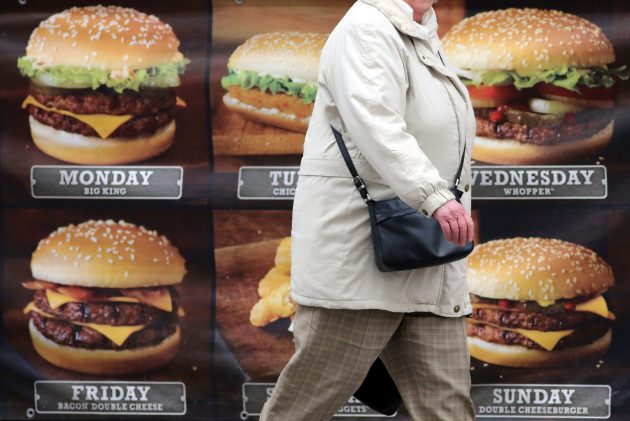Screenshot: Is the Netflix documentary craze coming to an end?

This week
**Media Moment of the Week: Proper propaganda
**Is the Netflix documentary craze coming to an end?
**Adland bins plans for junk food ad ban
Media Moment of the Week: Proper propaganda
Nothing screams flourishing democracy like a video of flag-waving children singing a patriotic anthem, right? That seems to be Gavin Williamson’s policy, anyway.
In a fresh satirical low, the education secretary is urging schoolkids to sing along to a new song celebrating One Britain One Nation day today. It didn’t take long for social media users to draw parallels with North Korea and the Hitler Youth. Or point out that most Scottish schools will have broken up for summer. Or that Northern Ireland isn’t in Great Britain.
Maybe I’m being too harsh though. After all, ridiculing this video is something the entire country can get behind.
Is the Netflix documentary craze coming to an end?
It was, as you may have noticed, rather a big week for government media announcements. With a great deal of fanfare, ministers confirmed plans to consult on a deal to privatise Channel 4. If a sale is eventually agreed, it will mark one of the biggest shake-ups in British broadcasting in recent years.
But there was more. DCMS also unveiled plans to tighten regulation of US streaming services such as Netflix, Amazon Prime and Disney Plus, the majority of which face no regulatory oversight in the UK whatsoever. With rising clamour over the fate of Channel 4, this threat crept largely under the radar.
The government says these plans will help to level the playing field for traditional broadcasters such as the BBC, ITV and Sky, which are battling the rise of on-demand platforms while still tied to Ofcom’s rules. Some of the proposed changes are practical and unglamorous, such as introducing new requirements on prominence, while the government has also suggested age ratings to help protect children.
Where it gets interesting, though, is the prospect of streaming giants falling under UK rules on accuracy and impartiality. Netflix, in particular, has set particular store by its blockbuster documentaries, cashing in on the true crime and environmental craze with hits such as Making a Murderer and My Octopus Teacher. But as far as accuracy is concerned, the Silicon Valley behemoth sometimes leaves much to be desired. Seaspiracy, a slick film on the impact of commercial fishing on our oceans, has been widely criticised by experts and charities for containing “misleading claims” and taking quotes out of context.
Currently, Ofcom rules on accuracy and impartiality only apply to news and current affairs, so it’s likely Netflix will argue that its shows fall outside this remit. But the government has explicitly put documentaries in its sights, so a widening of the regulator’s scope is very much on the cards.
The major question for Netflix and its streaming rivals, then, will be how they adapt to a new era under regulatory scrutiny. If its documentaries fall foul of Ofcom’s rules, will the streamer be forced to remove them? Or will some shows simply be banned for UK audiences? The plans are at an early stage, so the US giants will have a keen eye on the details in the government’s upcoming white paper. What’s clear, though, is that Netflix’s unchecked documentary craze could be coming to an end.
Adland bins plans for junk food ad ban

After a lengthy consultation, the government has confirmed plans to press ahead with a ban on junk food adverts, with TV campaigns outlawed before 9pm and a total block on paid-for promotions online. Suffice it to say, adland is not impressed. A string of high-profile industry figures hit out at the changes, branding them “hollow” and “misguided”, adding they were dismayed ministers had failed to take heed of their warnings.
The new proposals have, in fairness, been scaled back from original plans for a total ban. Some amendments have also been made to exclude small businesses from the rules and close a ridiculous loophole that would have classed staples like avocados and cheese as junk food.
Despite this, the numbers still don’t add up. Even the government’s own research back in 2019 concluded a pre-watershed ad ban would only reduce the average daily intake by 1.7 calories. It’s hardly game-changing. And yet the measures could cost publishers and broadcasters millions of pounds in lost advertising revenue and hamper marketing efforts for food and drink companies and hospitality businesses just as they emerge from the pandemic.
Efforts to tackle childhood obesity are, of course, important. But the reality is that there are numerous factors driving unhealthy lifestyles in this country, including insufficient exercise and a lack of access to affordable healthy foods. These larger issues are what will spark real change, but they’re far more challenging to address. One industry boss accused the government of pursuing “headline-grabbing” policies and, frankly, you can’t help but feel he has a point.
The algorithm recommends
- Buzzfeed has announced it’s going public through a US Spac deal. It’ll give everyone’s favourite listicle generator a valuation of $1.5bn.
- Former cabinet minister David Davis is spearheading a campaign against upcoming online safety laws, saying they’ll be “catastrophic” for free speech.
- EE is bringing back roaming charges for customers who want to use their phones in Europe. That’s despite all four networks saying they wouldn’t hike fees after Brexit.
- ITV is moving all its London staff to one base in White City – part of the BBC’s former campus.
Got a story? Drop me a line at james.warrington@cityam.com or on Twitter